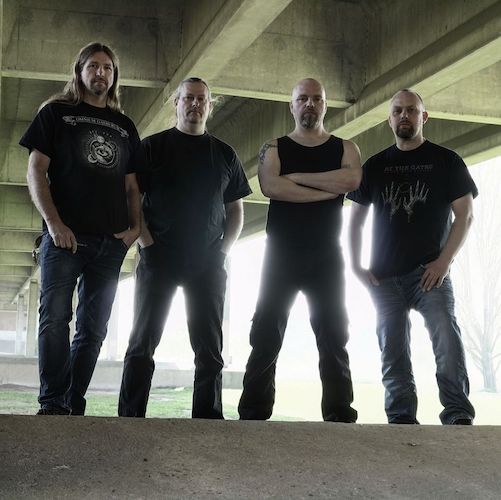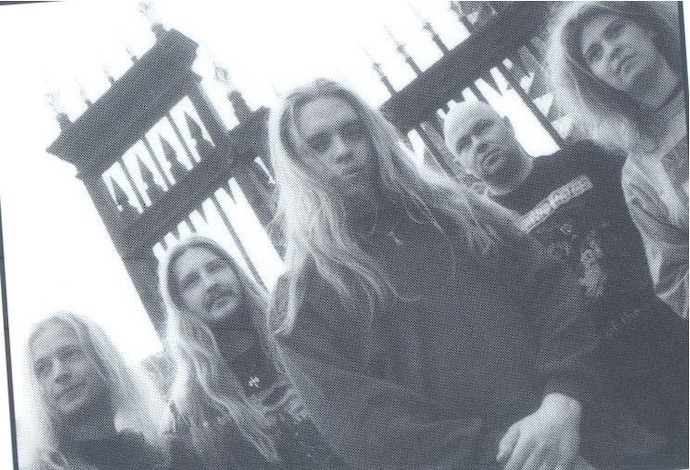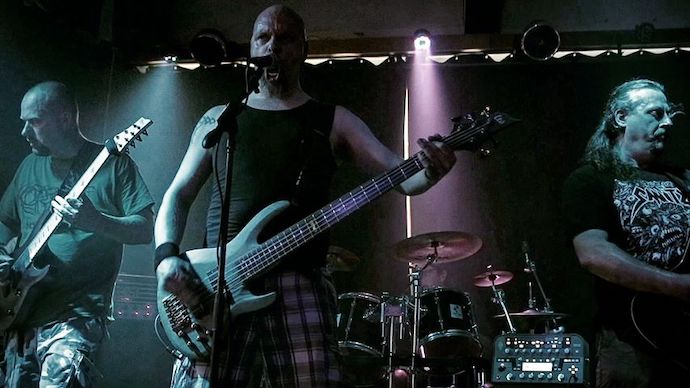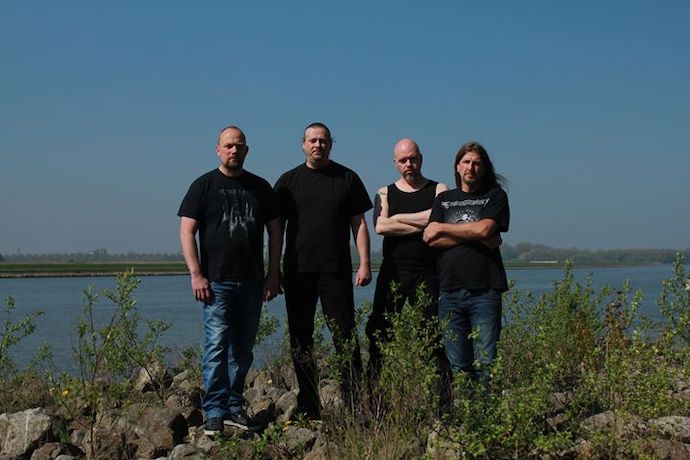
(In this interview conducted last year Comrade Aleks spoke with Eric Buizert, vocalist/bassist of the doom Dutch melodic death metal band Kurb Saatus, who first came to life in the ’90s and released their debut album in 2019.)
Kurb Saatus from the Netherlands celebrated their 25th anniversary last year with the release of… their debut full-length album!
Yes, I’m not kidding, this outfit who perform melodic death with minor doomy elements was formed back in 1994 but there were only a split with Officium Triste (1996), the single Never Forgotten, and a bunch of demos in their discography until May 2019 when The Withering was released. There are two members from the original lineup in Kurb Saatus — Hans van Wingerden (drums) and Eric Buizert (vocals, bass). So Eric is here!
******
Hi Eric! Accept my belated congratulations on the release of your debut album The Withering. It saw the light of day last spring, and so what have been people’s reactions? Can you tell that the album has drawn attention to Kurb Saatus?
First of all, thank you for your interest in us. The album is a few months old now and reactions and reviews are quite good. It draws a bit of attention, but we don’t really have a big fanbase because we have been inactive for so long.

The band was born in 1994 — what influenced your sound back then? It seems you tended to melodic death metal but there are some hints of doom elements as well.
Melodic death metal has always been the main influence for us, bands like Opeth, At The Gates and a lot of others, mostly the Swedish bands from the ’90s. The doom elements just evolve naturally I think. We don’t force doom into our music. It’s just what comes out.
Your first period seems to have been very busy: you recorded your first demo in 1994; another demo appeared in 1995; and the single Never Forgotten was released in 1997 after the promo split with Officium Triste. Were you really so focused in first years? How much time did it take to keep the band running?
The first years seemed a lot more productive, that’s true. After the first recordings it became more and more difficult to write music because of problems within the band. We changed the line-up quite a few times. We changed a few guitar players, a few singers, and a bass player. This is also part of the reason the music is quite different from what we used to make.
Did the demos really help to spread the word about Kurb Saatus? Or did the official single work better?
The demos and the single worked ok, but in the nineties there were a huge number of metal bands in the Netherlands and it was difficult to really stand out. We also had one or two members who were quite shy and had some problems on stage.
Kurb Saatus – Escapism
How often did you play gigs in the ’90s? What were your highlights?
We never really had big gigs. We are as you could say a “well-kept secret”. However all of our gigs are good memories and some of them were quite special to us.
What was your environment back then? Did you feel yourself a part of doom or death scenes, or the metal scene in general?
We were never really part of the doom scene, we never considered ourselves doom metal.
We were just a metal band, we never really thought about what we were until much later.
You recorded the next demo only in 2002. What slowed you down? And what prevented you from recording a full-length album?
So many things, it just wasn’t meant to be back then.
The band wasn’t officially disbanded but there weren’t any records for the next 15 years. What happened?
The problems at that time were mostly struggles within the band, which led to me leaving. Back then I was the guitar player, and shortly after the vocalist left as well. It wasn’t until I came back a few years ago that everything started to work a bit again.
Kurb Saatus – Never Forgotten
Finally, a new demo appeared in 2017 and it led you to the debut album The Withering, released in May 2019. How long did you compose this material? What’s the story behind it?
The material took quite a long time to compose, also because there was no vocalist for a long time. The story behind it, it’s a collection of songs mostly about human emotions, Hans (van Wingerden, drums), and I write the lyrics. All four of us write the music.
Did you see it as continuation of Kurb Saatus’s early practice or is it something different for you?
It was always a continuation of Kurb Saatus, we never tried to reinvent ourselves. What we are now is just the normal evolution of the Kurb Saatus sound, at least to us it is.
The Withering is a self-released album, so how have you solved questions of promotion and distribution?
We do have a small deal with a very small Dutch distributor, but mostly we sell them at gigs and to some of our fans on the internet. We never really thought in big numbers, so we try to keep it small, we do everything ourselves.

Does it mean you play more often nowadays? How intensive is your schedule?
Yes we play more often, but still not a lot. We never set out to become world famous or really busy touring with the band. We all have jobs, families, and friends. Our lives are here, not on the road. That being said, we would love to play, and a few bigger gigs would be nice to spread the word about us.
Do you feel there are more opportunities for Kurb Saatus to reach listeners than there were in ’90s?
There are two sides to that. It’s easier now because of the internet. Basically everyone is connected. We used to be dependant on tape traders and people like that. However because of the internet and how easy it is to record very good sounding albums for almost everyone, there is so much music. Again, it’s hard to get noticed, hard to stand out.
As Kurb Saatus was born in 1994, you celebrated your 25th anniversary, just as your colleagues Officium Triste did. How would you sum up your experience of being in the band for that period?
Mostly a lot of fun, though I have been gone for 10 or 11 years. There were some struggles within the previous line-ups, but that’s all in the past.
Kurb Saatus – Silent Waters
You took part in the Officium Triste tribute Born To Lose – Doomed To Die and covered their song ‘Dreams Of Sorrow’ taken from that split album you took part in. Did you keep in touch with Pim and the band all this time?
Yes, we started in the same year and not long after that we ended up in the same rehearsal studios. Pim is a good friend of the band, and lives quite close to us. We did our first gig together, which was a lot of fun.
Actually, I learned about the band due to this tribute, because I remember that I had checked Kurb Saatus’ discography some time ago and there wasn’t anything new for that moment. Did this tribute help you to reach new listeners besides me?
A few, yes. Officium Triste has a big fanbase but our music is so very different to theirs.

Forgot to ask you! What does Kurb Saatus mean?
It means “Sad Destiny” in Estonian. Our first vocalist was from Estonia, and that is where the name comes from.
I guess that’s all for today, just one last question is left. Do you plan to record another album in the future?
Yes, short answer. We are writing new material. We will try to be faster this time (so hopefully not another 15 years will go by).
So please be a little patient, new stuff is underway.
https://kurbsaatus.bandcamp.com/
https://www.facebook.com/KurbSaatus/

Look for us on Spotify too!!!